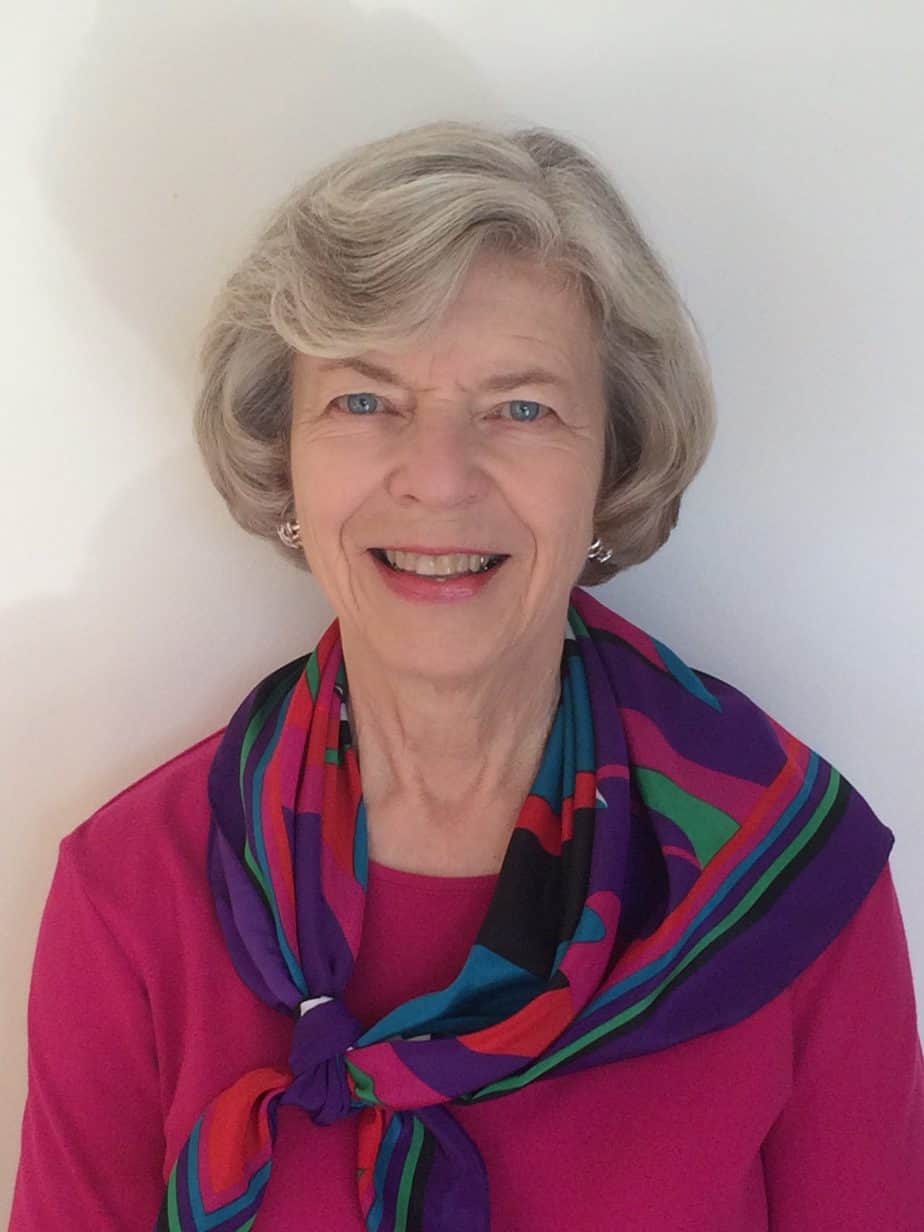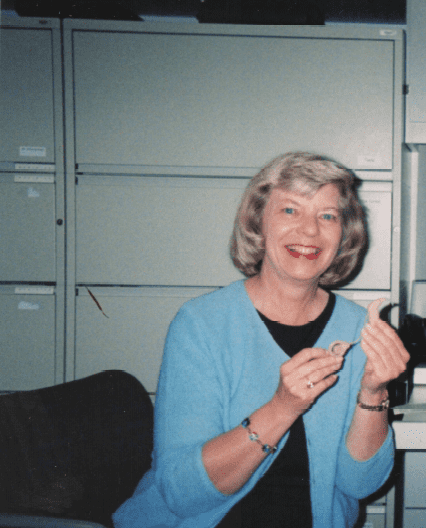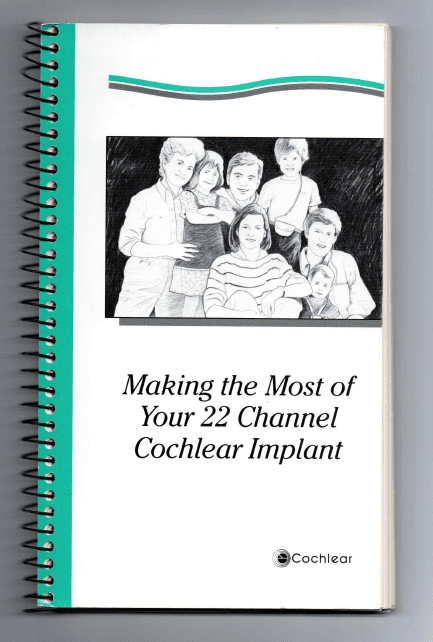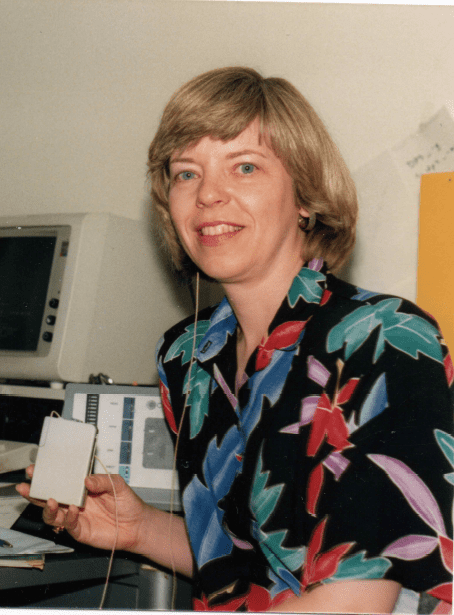Pat had never heard of Cochlear when she came across their booth at a convention in 1988. At 46 years of age, Pat held the successful title of vice president at a renowned advertising agency. Still, she found her profound hearing loss limited her options. A few short months after that first encounter, Pat became one of the first American recipients of the Cochlear™ Nucleus® 22 Implant System.
“I started losing my hearing in 1960, just as I entered the University of Illinois. Over 12 years, my hearing loss declined to profound, leaving me little time to adjust and cope. Living with hearing loss was very stressful. I relied on vision, lipreading and the help of others. To manage phone conversations at work, my secretary would listen on one phone on my desk, silently mouthing what the caller was saying so I could read her lips, then I spoke using a second phone. Each day required intense concentration and alertness. I wore high-powered hearing aids that only gave awareness of sound but no clarity of speech or ability to hear music.
A fateful day at a convention booth
 It was 1988, at the age of 46, I was at the Self Help for Hard of Hearing People (SHHH) convention, which is now known as the Hearing Loss Association of America (HLAA). I came across Cochlear’s corporate booth in the exhibitor’s hall. I asked many questions and within 30 minutes decided to find out if implantation was an option for me.
It was 1988, at the age of 46, I was at the Self Help for Hard of Hearing People (SHHH) convention, which is now known as the Hearing Loss Association of America (HLAA). I came across Cochlear’s corporate booth in the exhibitor’s hall. I asked many questions and within 30 minutes decided to find out if implantation was an option for me.
The convention was in June. I made my testing appointment for August and my surgery was in late September. I was activated (back then it was called ‘hook-up’) on Halloween. What a treat! I was fortunate to understand speech on that first day. I also quickly rediscovered my love of music, constantly buying music cassettes and listening on my Walkman.
Life with my new hearing
 Being able to hear again gave me so much. I could drop my standard speech where I explained to people: ‘I don’t hear well, so I need to see your lips when you speak,’ in all sorts of daily encounters. I could order in a restaurant without having to explain my hearing. This was a delightful difference. I no longer needed my friends to assist me. I was more independent.
Being able to hear again gave me so much. I could drop my standard speech where I explained to people: ‘I don’t hear well, so I need to see your lips when you speak,’ in all sorts of daily encounters. I could order in a restaurant without having to explain my hearing. This was a delightful difference. I no longer needed my friends to assist me. I was more independent.
I was implanted while my aging parents were still alive. It meant so much to me to be able to connect with them by phone. The conversation I had with my father the night before he unexpectedly died is a treasured memory for me. My implant allowed me to be the caregiver for my mother for the eight years she lived beyond my father. This would have been incredibly difficult without the hearing provided by my cochlear implant.
Changing careers as opportunities arose
With the cochlear implant, I was able to change careers throughout my life as opportunities presented themselves. I wanted a career that offered more meaning beyond my role in advertising. First, I started my own consulting business helping public accommodations and businesses comply with the newly enacted Americans with Disabilities Act (ADA). Then I went back to college to earn a master’s degree in counseling to become a career counselor. In addition to working for a career management firm for eight years, I freelanced as a corporate trainer, helping engineers understand the needs of people with disabilities when they designed communications equipment. All these roles, plus other independent gigs, would have been impossible without my implant. I embraced retirement in 2003, free to explore other things of interest to me.
Now I volunteer with The Village Chicago, a social network for people over 50 in Chicago. I’m focused on helping to change the narrative on aging: that older adults can have a meaningful purpose and still contribute to our communities. As a life-long learner, I have many adventures ahead of me.
Living with a cochlear implant for over four decades
 My first sound processor was body-worn and required a wire that went under my clothes to connect to the microphone and coil on my head. It was all new, and we didn’t have all the resources and help we have today! I wrote a book for Cochlear titled ‘Making the Most of Your 22 Channel Cochlear Implant’ to help people with the implant adjust to this new way of hearing and living.
My first sound processor was body-worn and required a wire that went under my clothes to connect to the microphone and coil on my head. It was all new, and we didn’t have all the resources and help we have today! I wrote a book for Cochlear titled ‘Making the Most of Your 22 Channel Cochlear Implant’ to help people with the implant adjust to this new way of hearing and living.
Since then, I’ve had five upgrades to the Nucleus 6 Sound Processor I currently use. It’s so much more comfortable. Now, I put it on in the morning and wear it until bedtime. Being able to wear it on the ear without wires has been one of the biggest improvements since those early days. And the advances in programming options have been astounding.
I’m looking forward to upgrading to the Nucleus 7 Sound Processor later this year once my insurance upgrade kicks in.
Advice for the new cochlear implant recipients
As you prepare to get your new sound processor, all I can say is to be very optimistic. Be prepared to do your listening therapy — there’s so much more offered now. We had nothing in my day. Put some time into it every day, plus simply use everyday life as a listening experience. See where you come out. Don’t limit yourself by thinking, ‘my hearing is never going to be perfect.’ Perfect doesn’t exist for anybody.
It changed my life. Not everyone gets my kinds of results with a cochlear implant. Nevertheless, you should be optimistic and work hard at it. You need to really reach deep into yourself and ask: What is the best use of your life? What do you most want to do?”
Are you struggling with hearing loss like Pat, one of the first American recipients, was? Learn about a solution that can help you today.
